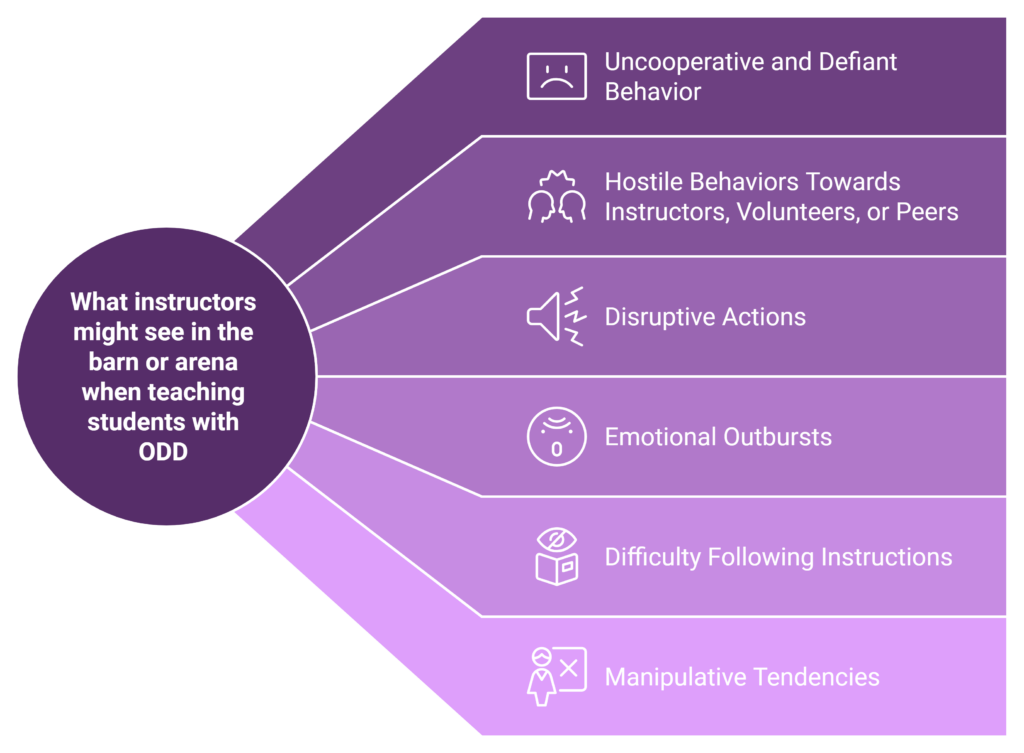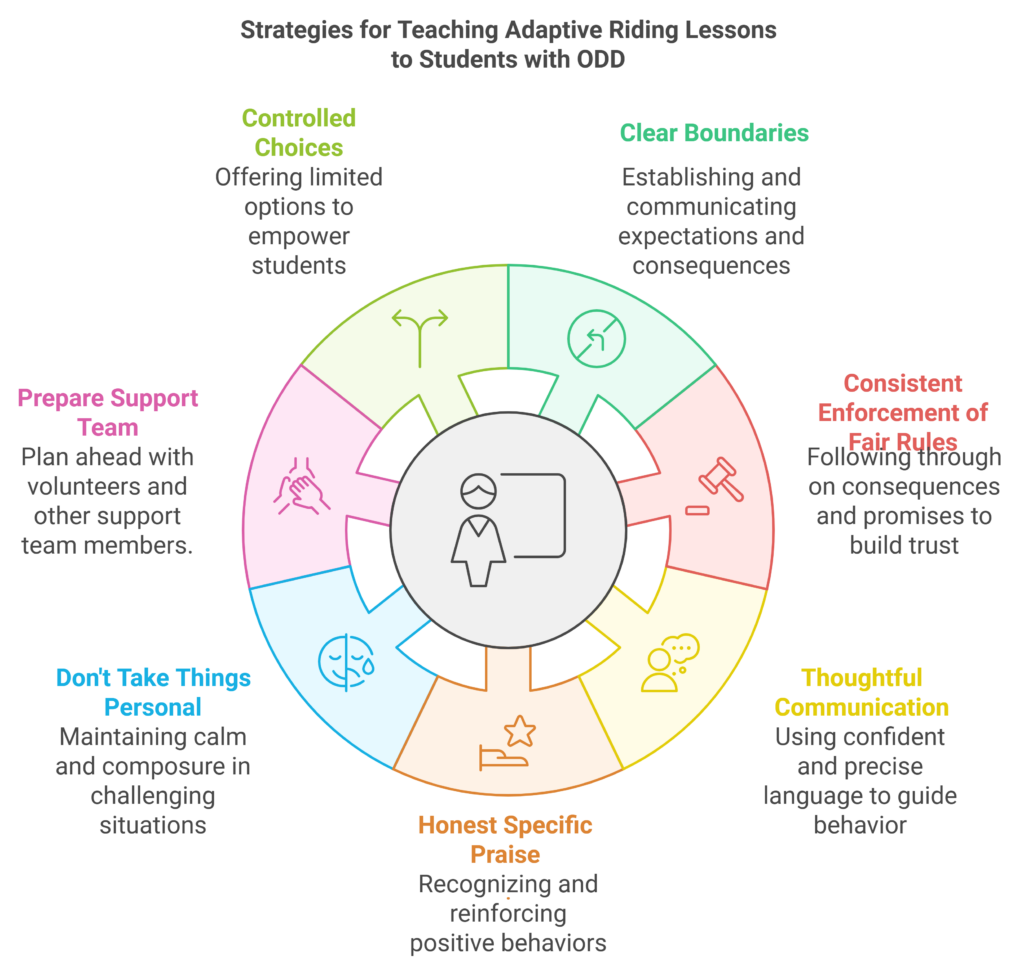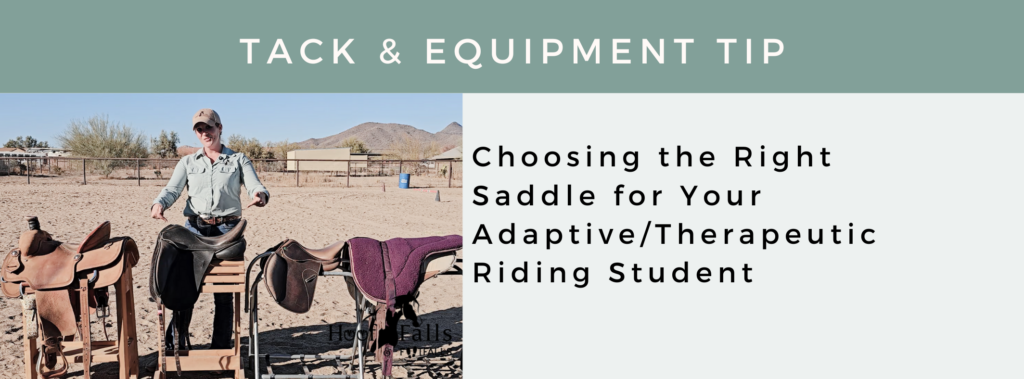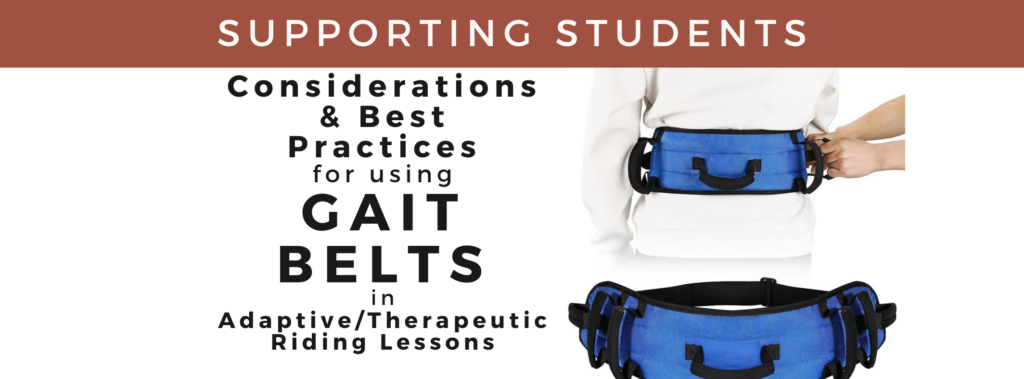
7 Tips for Teaching Students with Oppositional Defiance Disorder (ODD)
During my time as an adaptive/therapeutic horseback riding instructor, I’ve had the privilege of working with a wide range of students who all had their own unique personality and often formal diagnoses. Some students I have taught had been diagnosed with Oppositional Defiance Disorder (ODD)1 and the tips and tools I want to pass on comes from teaching this set of students.
While teaching countless lessons over the years and not only experiencing success but also failure, I’ve learned valuable techniques and strategies that have helped me better support students who have been formally diagnosed with ODD or those who might display similar behavioral characteristics.
In this blog, I’ll share what instructors might see out in the barn or arena when working with students with OOD as well as the top seven tips and tools I commonly implement in my lessons to set everyone involved up for success.
What might an instructor see in the barn or an arena when teaching a student who has ODD?
- Uncooperative and Defiant Behavior: Students with ODD may refuse to follow instructions, argue with the instructor, and actively defy the rules or expectations set in the arena.
- Hostile Behaviors Towards Peers or Other Support Individuals: Individuals with ODD can exhibit hostile, aggressive, or vindictive behaviors towards their peers, such as verbal put-downs, physical aggression, or attempts to manipulate or undermine other students or their volunteers and instructor.
- Disruptive Actions: Students with ODD may engage in disruptive behaviors that interrupt the flow of the lesson, like yelling, throwing objects, or intentionally distracting others.
- Emotional Outbursts: ODD is often characterized by emotional dysregulation, leading to sudden and intense outbursts of anger, frustration, or defiance, even in response to minor triggers.
- Difficulty Following Instructions: Instructors may find that students with ODD struggle to follow multi-step instructions or consistently adhere to the rules and expectations of the riding lesson and barn environment.
- Manipulative Tendencies: Students with ODD may try to manipulate authority figures, such as the instructor or volunteers, by playing them against each other or providing selective information to get their way.
Remember that each student is an individual and the severity and frequency of possible behaviors related to ODD can vary. Behaviors may be more or less pronounced depending on the individual student and may be different lesson to lesson based off the specific context of each session. Understanding common characteristics and of ODD can help instructors develop and implement effective strategies to support and teach students with ODD.
7 Tips for Teaching Students with ODD
1. Set Clear and Fair Boundaries
Establishing clear and fair boundaries in the arena is crucial to setting you and your student up for success. Clearly communicate your expectations for your student’s behavior, such as kind words, no hitting or kicking, and following instructions. Clearly communicate the consequences that will result when each expectation is or is not met. Consequences can be positive or negative!
2. Follow Through on Implementing Rules and Boundaries
It’s not enough for instructors to simply set and verbalize the boundaries – we must fairly and consistently follow through on implementing them. When a student doesn’t meet the expectations, calmly and promptly enforce the consequences. This builds trust and shows the student that you mean what you say.
3. Be Aware of Your Wording and Phrasing
The way instructors communicate can significantly impact a student’s behavior. Use a confident tone, land your sentences with periods, and provide controlled choices rather than open-ended questions. This helps prevent students from seeing any wiggle room to push boundaries. Another strategy that can be very helpful in creating clear communication is using positive phrasing, or “DO” phrasing vs. “don’t” phrasing, during your lessons.
4. Give Specific and Honest Praise
Instructors should look for opportunities to provide specific, honest praise when students demonstrate the desired behaviors- catch them being good! Honest praise and looking for a small snippet of a good behavior can be especially impactful during moments when they are being uncooperative. Recognizing their small wins can help shift the focus, build their confidence, and increase positive behavior.
5. Don’t Take Things Personally and Remain Calm
Students with ODD may say unkind things or act out in a way that feels like it is a personal attack on the instructor. It’s important for instructors to not to take these behaviors personally. If, or more likely, when this happens in a lesson, lead by example and demonstrate good self-regulation: take a deep breath, calmly address the behavior, and move forward. Modeling appropriate emotional regulation can be a wonderful thing for our students and volunteers to see and learn from.
6. Be Aware of the Support Team
Students with ODD may try to manipulate different authority figures, like parents, teachers, and volunteers, against each other. Instructors should communicate with the entire support team to ensure everyone is on the same page regarding rules, boundaries, and expectations. This communication can happen before, during, or after a lesson and goes a long way in establishing a unified front.
7. Give Controlled Choices
Providing students with controlled choices during lessons can help them feel empowered and keep them engaged. The controlled choices – instead of open ended ones, help instructors tactfully maintain the structure and boundaries that have been set. Instructors can offer two or three options that align with the class expectations and/or appropriate riding skills that are being practiced.
Final Thoughts
Remember, working with students who have ODD can be challenging, but with the right tools and strategies, you can create a positive, productive lesson environment. Don’t be afraid to seek support from experienced instructors or mental health professionals if you need additional support.
I hope these information and tips above help you feel more equipped and confident in supporting and teaching your students with ODD. If you have any other questions or would like to share your own experiences, I’d love to hear from you! Feel free to comment below!
Have you tried any of the tips above? Have they worked for you? I’d love to hear in the comments below.
Additional resources:
Want to learn more about topics mentioned in this post? Check out the Intuitive Instructor Content below:
You are currently on Hoof Falls & Footfalls’ learning platform. Return to our main website HERE.
Hoof Falls & Footfalls is supported by YOU! Each time you buy through affiliate links from my site, I may earn commission (at no extra co








Responses